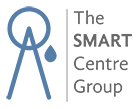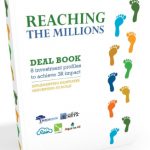 On the 22nd of March, during World Water Day, a new joint publication of the 3R group was launched: Reaching the millions – investment profiles to achieve 3R impact. It clearly makes a case why it is not only worth the investment to put money in water harvesting, it is urgent.
On the 22nd of March, during World Water Day, a new joint publication of the 3R group was launched: Reaching the millions – investment profiles to achieve 3R impact. It clearly makes a case why it is not only worth the investment to put money in water harvesting, it is urgent.
Latest news
CAWST and SCG joint blog
The SMART Centre Group and CAWST have joined hands in writing up key lessons on training and capacity building through local WASH centres of expertise. We foresee this to be the start of a long term cooperation endeavour between the two organisations. Read the whole article here.
Unique opportunity for initiators and entrepreneurial personalities!
International Course “Market-led SMARTechs for water and agriculture” in Mzuzu, Malawi from the 19th to the 23rd of March 2018. Apply now!
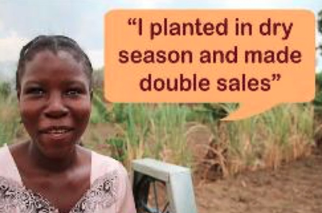 The SMART Centre Group and SNV are organising a course to provide policy makers and practitioners in water and agricultural management with a holistic set of knowledge and skills to take water and agricultural initiatives to the next level.
The SMART Centre Group and SNV are organising a course to provide policy makers and practitioners in water and agricultural management with a holistic set of knowledge and skills to take water and agricultural initiatives to the next level.
Participants of the course become true agents of change and accelerate reaching several SDGs simultaneously. Click here to download the course flyer and read how to apply.
SMART Centre helps fight Cholera
January 24, 2018. In Zambia, there are over 3000 cases of Cholera. The Jacana SMART Centre in Zambia helps reducing the spreading of Cholera by closing open wells, installing low cost hand pumps, and promoting household water filters. More information https://jacana.help/news/zambia-attack-cholera/
Training in manual drilling and hand pumps in Malawi
January 17, 2018. Starting from today, the CCAP SMART Centre in Mzuzu is organising a training on the ‘Mzuzu drill technology for a group entrepreneurs and technicians. This technology is suitable for wells of 10 to 20 meters deep for small communities as well as for Self-supply. Average costs range from 200 to 500 USD, including PVC casing and a handpump. The training also covers constructing various hand pumps and solutions for water harvesting and sanitation. All technologies are fully made with locally available materials. More information www.smartcentremalawi.com or www.smartcentrezambia.com.
More resources online
September 13, 2017. Newly uploaded manuals are available in the Resources section!
Watch our new clip
Take a few minutes to have a look at our new video clip explaining the SMART Centre Approach
SMART Centres in Stockholm
This year the SMART Centres will also be represented at the World Water Week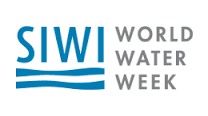
in Stockholm from the 27th of August until the 1st of September. You find us there at stand
no. 18 together with social enterprise Basic Water Needs, showcasing various SMARTechs, including the Tulip Water Filter. This is an effective and affordable filter for the Base of the Pyramid, produced in both Africa and Asia. Please visit us at stand no.18 for demonstrations, a cup of safe water, material on various SMARTechs and explorations on how we can work together to
accelerate reaching the water related SDGs.
SMART Centres at WEDC
 The SMART Centres were represented at the annual WEDC conference in the UK (24th to the 28th of July 2017) and had a stand together with Transform International. Presentations bij the SMART Centres on Self-supply included:
The SMART Centres were represented at the annual WEDC conference in the UK (24th to the 28th of July 2017) and had a stand together with Transform International. Presentations bij the SMART Centres on Self-supply included:
- Supported Self-supply as a key to reach water, food and poverty related SDGs by Henk Holtslag
- How can Self-supply help reaching SDG 6? by Rik Haanen
Other presentations on Self-supply were given by Dr. Sally Sutton and Dr. Peter Harvey. Both clearly indicated that (supported) Self-supply is essential to reach the SDG 6. The presentation of Peter Harvey showed that for Zambia, where a large part of the unserved live in communities of less than 250 people, water access via family wells could be 6 times cheaper than using conventional communal water supply. Compared to communal wells, Self-supply wells have advantages like convenience and more hygiene since water is near, and possibilities of food production for own use and sales to local markets. As presented at the RWSN conference in 2016 other advantages of family wells include the high ownership and the fact that families share water with others so Self-supply can become communal supply. A topic related to Self-supply is house water treatment. A successful programme on selling effective and affordable water filters in Tanzania was presented by Dr. Annemarieke Maltha of Basic Water Needs.
Many more papers, presentations and posters can be downloaded under Resources.
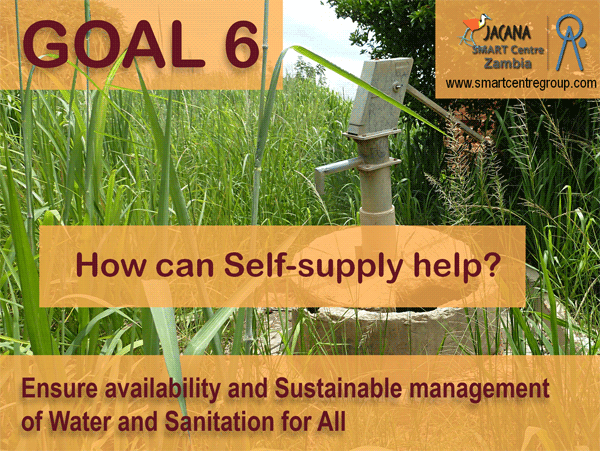
SMART Centres at the Innovate for Water Event, Geneva
On behalf of the SMART Centre Group, Walter Mgina and Jasmina van Driel attended the Innovate for Water event (8th and 9th of June 2017). This was a matchmaking forum focusing on water, sanitation, entrepreneurship and sustainable investment. Day 1 was specifically geared to connecting entrepreneurs or entrepreneurial initiatives with (social impact) investors. Day 2 was an open forum, which provided an opportunity for meaningful interactions around Technologies, Business and Human Rights among water experts, impact investors, social entrepreneurs, multinational corporations, NGOs and UN agencies. On both days the SMART Centre approach was pitched by Jasmina.
